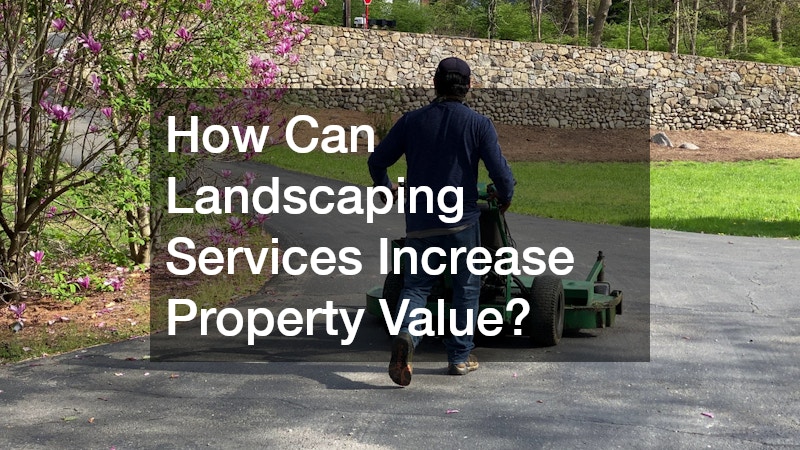Landscaping is often seen through the narrow lens of lawn care, where the primary focus appears to be on mowing, fertilizing, and basic yard maintenance. This perception, however, overlooks the wide range of services that professional landscapers provide beyond just attending to the grass. By asking whether landscapers can help with more than just lawn care, we open up a comprehensive exploration into the myriad ways these professionals can transform outdoor spaces.
What Services Do Landscapers Offer Beyond Lawn Maintenance?
Landscape design and planning involve a strategic approach to crafting outdoor environments that are both beautiful and functional. Landscapers work closely with clients to understand their vision, utilizing their expertise to plan layouts that maximize space while maintaining harmony with the natural surroundings.
Through this collaborative process, they integrate a variety of elements such as plant selection, color schemes, and spatial arrangements.
Moreover, landscapers consider long-term growth and changes in their design plans, ensuring that the landscape matures gracefully over time. They use their knowledge of horticulture and environmental factors to suggest suitable plants that will thrive in specific climates and soil conditions. This thoughtful planning emphasizes both the immediate aesthetic impact and the enduring benefits of a well-designed landscape.
Beyond aesthetics, landscapers also focus on practical aspects, such as accessibility and maintenance efficiency. By incorporating pathways and structured planting beds, they create spaces that are easy to navigate and upkeep. As a result, the landscape not only becomes a visual delight but also a practical area that complements the lifestyle of the property owner.
Hardscaping includes the construction and integration of non-plant elements such as patios, decks, and pathways, which significantly enhance the usability of outdoor spaces. These features not only add to the comfort and functionality of an area but can also significantly increase property value. For instance, a well-designed patio or deck serves as an excellent space for social gatherings and family activities, seamlessly extending indoor living to the outdoors.
The installation of outdoor structures often requires skilled craftsmanship and an understanding of materials to ensure durability and aesthetic appeal. Landscapers bring their expertise to the table, recommending appropriate materials such as natural stone or pavers that blend well with the environment. Their ability to combine hardscape with softscape elements results in cohesive designs that are both practical and visually appealing.
How Can Landscaping Services Increase Property Value?
The first impression of a property is greatly influenced by its exterior, making curb appeal a crucial aspect of real estate value. Professional landscaping greatly enhances this appeal by creating a welcoming and aesthetically pleasing entry. Strategically placed plants, well-maintained lawns, and attractive hardscapes all contribute to a property’s visual allure.
Landscapers specialize in selecting and arranging greenery that complements the architectural style of a home, creating a cohesive look that attracts potential buyers. Features such as flowering plants, decorative shrubs, and trees add texture and color, providing visual interest throughout the year. This not only heightens the property’s charm but also creates a sense of pride and ownership for current residents.
Moreover, an inviting landscape suggests that the property is well cared for, which is a significant selling point for homebuyers. The immediate impression of a beautifully landscaped yard can be the difference between a quick sale and a prolonged listing. Consequently, investing in landscaping can yield impressive returns by boosting both the asking price and marketability of a home.
What Are the Environmental Benefits of Professional Landscaping?
Professional landscaping contributes significantly to biodiversity by incorporating a variety of plant types that support different wildlife species. Landscapers often select native plants that are well-adapted to local conditions, providing food and habitat for indigenous fauna. This ecological approach not only beautifies the area but also strengthens the local ecosystem.
The use of native plantings can reduce the need for chemical fertilizers and pesticides, leading to healthier soil and a safer environment for both pets and humans. Native plants are typically better at resisting pests and diseases, and they play a critical role in maintaining balanced ecosystems. By fostering this ecological harmony, landscapers help curb the negative effects of invasive species and promote environmental health.
Furthermore, promoting biodiversity in landscaping designs offers resilience against the impacts of climate change. Diverse plantings are more adaptable to shifting weather patterns, ensuring the sustainability of the landscape over time. This proactive approach supports the preservation of biodiversity, which is crucial for the ecological balance and health of the planet.
The role of landscapers extends far beyond mere lawn care, encompassing a wide array of services that enhance both property value and environmental well-being. From intricate design and planning to the implementation of sustainable practices, landscapers transform outdoor spaces into aesthetically pleasing, functional, and eco-friendly environments. Their contributions not only enrich the immediate landscape but also promote long-term environmental conservation, demonstrating the integral role of professional landscaping in creating greener, more sustainable communities.



